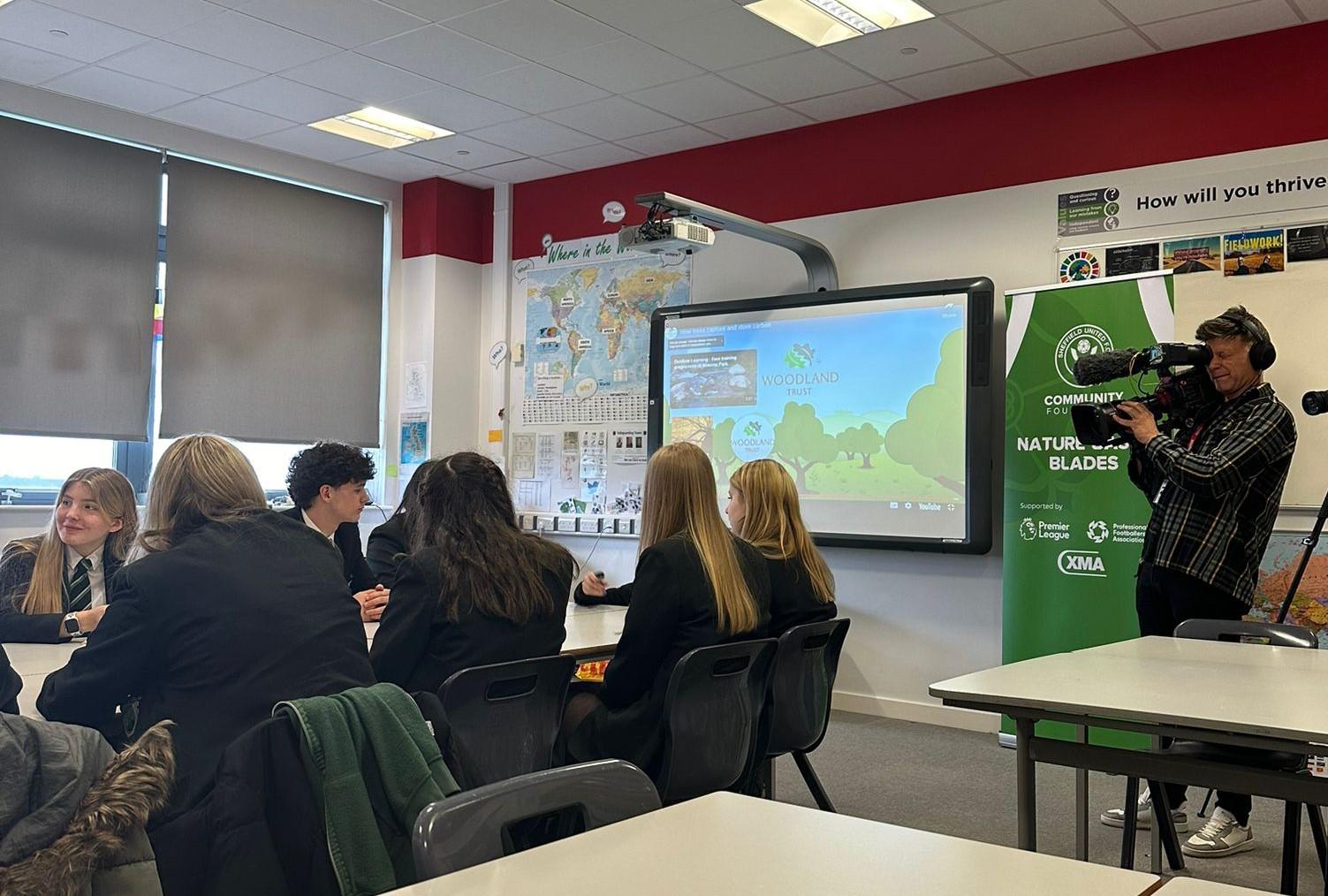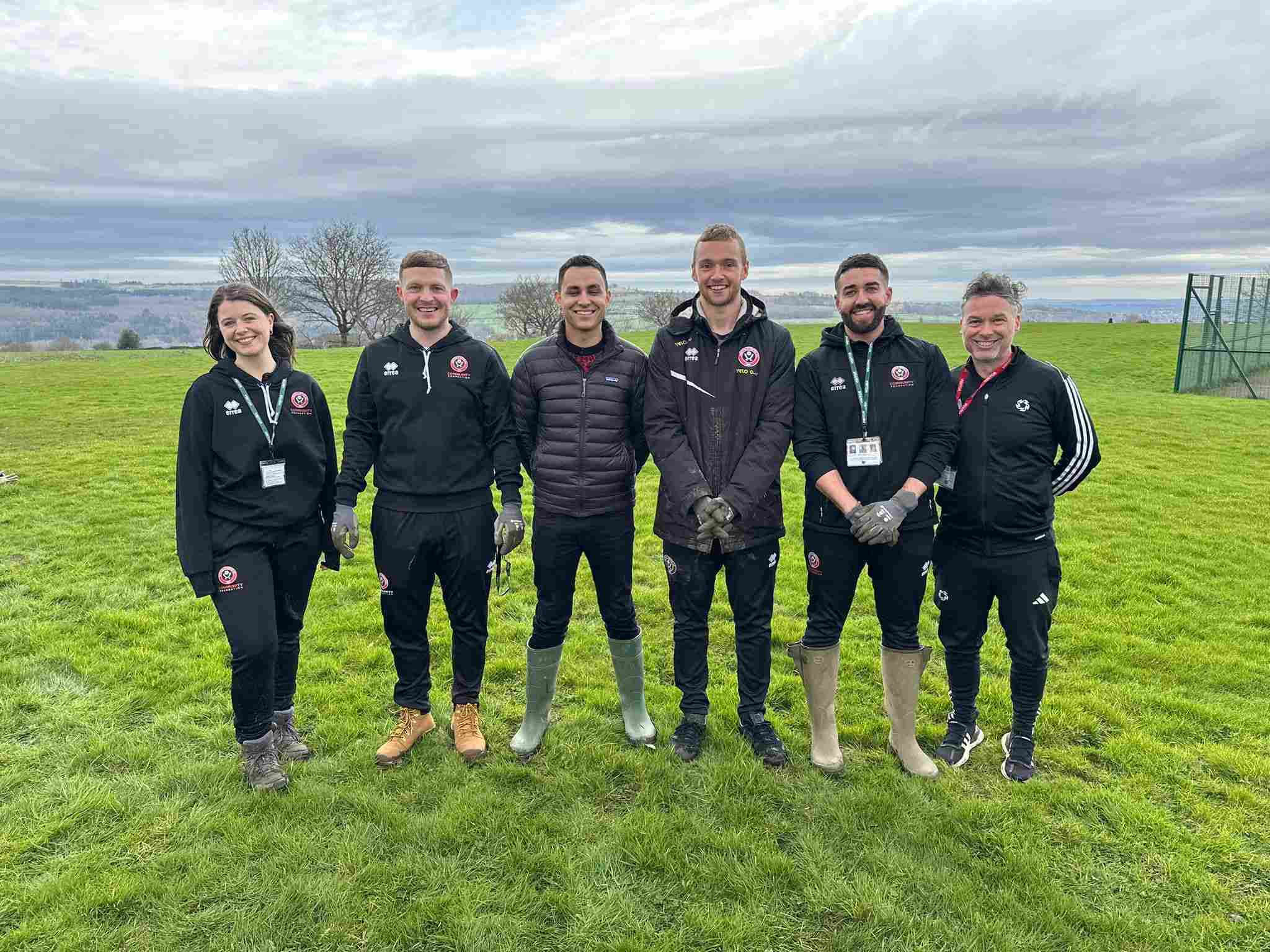EFDN, Sheffield United and the power of Sports in Environmental Sustainability
Kicking for the Future: How Football Clubs are Creating Sustainable Urban Spaces
As the world becomes more urbanised, cities face major challenges such as climate change, social inequality, and the loss of green and community spaces. Sustainability and social responsibility are increasingly crucial, demanding innovative solutions. Enhancing urban nature addresses these challenges, offering numerous environmental, health, and social benefits, including improved air quality, bolstered mental health, and reduced summer temperatures.
An unexpected yet powerful force is emerging to blend environmental initiatives with social action: football. Football clubs, the heart of many cities and towns, provide a platform to promote sustainability, education, and social justice. With their vast reach and deep community roots, football clubs are uniquely positioned to drive positive change not only in sports but also in the urban environment. City leaders should take note: partnerships with football clubs can help local and regional authorities address urban challenges such as creating greener public spaces, sustainable urban planning, and youth engagement.
Say it loud for those in the back – Football has the power to change the world. This conviction is not new: sport is recognised as a fundamental right and a powerful tool for strengthening social ties, promoting sustainable development, and fostering peace, solidarity, and mutual respect. In cities, where environmental and social solutions are urgently needed, football offers unique opportunities to support local infrastructure development and mobilise communities to achieve common environmental and social goals. This draw is especially strong among young people.

Workshop on environmental education and NbS as part of the Nature Based Blades project. Copyright by Sheffield United Community Foundation
Global Initiatives in Practice
Cities and sports clubs worldwide are already harnessing this potential. Spain’s Real Betis integrated green spaces and native plants into their sports facilities, offered employees access to scooters and electric bikes, and encouraged fans to use active transport. Football Ecology France facilitated a partnership between the city of Médard en Jalles, local football clubs, and community members that resulted in the planting of an urban forest.
EFDN and ICLEI Europe: Partnering for Sustainable Urban Development
The European Football for Development Network (EFDN), alongside ICLEI Europe—a network of over 1400 cities dedicated to sustainable urban development—and the EU Horizon project NBS EduWORLD, demonstrates how football clubs can share knowledge about nature-based solutions (NbS). NbS leverage healthy ecosystems to mitigate climate change impacts while enhancing biodiversity, inspiring action, and serving as a model for city officials interested in replicating their success.
The Power of Football to Mobilise Urban Communities
What makes these initiatives so effective is the close relationship between football clubs and their local communities. A recent survey by the Football for Climate Justice project, in which EFDN is a partner, found that 53% of respondents believe football clubs should play a role in developing climate change solutions.
Football clubs enjoy a high level of trust and are in close contact with their communities, allowing them to communicate important social issues, such as climate change, directly to their fans. The survey also revealed that 79% of respondents feel strongly connected to their football club, highlighting that football is more than just a game. Football clubs can significantly impact urban communities, promote sustainable thinking, and offer long-term solutions to contemporary challenges. Through EFDN’s efforts, projects like NBS EduWORLD are realising this potential.

Footballers and students take action: Joyfully anticipating making a difference to the environment. Copyright by Sheffield United Community Foundation
Football as a Bridge Between Sport and Education
The Nature Based Blades project, run by Sheffield United Community Foundation—an EFDN member and an indirect partner of NBS EduWORLD—is a prime example of how football and education can collaborate in urban settings. This project uses football to model the positive impacts of NbS and inspire local action.
Based in Sheffield, a city known for its blend of urban and green spaces, the project integrates environmental education into the football club’s operations, offering an alternative, playful form of education for young people who may struggle with traditional learning methods. It demonstrates how clubs like Sheffield United can raise awareness of environmental issues and create links between recreation, environmental activism, and student education. Football clubs can be more than just sporting institutions—they can serve as community centres. Projects like Nature Based Blades show they can shape urban spaces to better meet the needs of local residents.
A Call to Action
By integrating NbS into their educational programmes, football clubs engage local communities and promote environmental awareness and sustainable practices. By partnering with city planners and local officials, they can promote greener public spaces, eco-friendly transport, and inclusive community facilities. Their reach can influence policies around sustainability and environmental justice, ensuring equitable urban development. As these initiatives grow, the question remains: How can we further harness the power of football to create a more sustainable and connected urban future?
Main authors: Almut Ballstaedt (ICLEI Europe), Kassia Rudd (ICLEI Europe)
Contributors: Kelly Baldwin Heid (ICLEI Europe), Matheus Cavalcanti (EFDN), Clotilde Mahé (ICLEI Europe) and Philipp Reissner (EFDN)
Source: Themayor. (2024, September 19). Kicking for the Future: How Football Clubs are Creating Sustainable Urban Spaces. TheMayor.EU. https://www.themayor.eu/en/a/view/kicking-for-the-future-how-football-clubs-are-creating-sustainable-urban-spaces-12778



